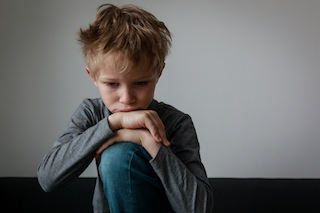 A new study from the University of East Anglia, published in the Journal of Psychology and Psychiatry looked at how common post-traumatic stress disorder (PTSD) is in children and adolescents in the initial weeks and months following a trauma.
A new study from the University of East Anglia, published in the Journal of Psychology and Psychiatry looked at how common post-traumatic stress disorder (PTSD) is in children and adolescents in the initial weeks and months following a trauma.
“Why do some young people show no clinically significant PTSD symptoms early on,” study lead researcher, Dr. Richard Meiser-Stedman told us, “while others show a significant reaction?”
According to the U.S.National Center for PTSD, up to 43 per cent of children experience trauma. Of those children who experience trauma, three to 15 per cent of girls and one to six per cent of boys go on to develop PTSD.
“We were really interested in the cognitive model of PTSD proposed by Anke Ehlers and David M. Clark,” Dr. Meiser-Stedman told us. “This model was proposed primarily with adults in mind.”
Ehlers and Clark are the authors of: A Cognitive Model of Post-traumatic Stress Disorder, published in 2000 in the Journal of Behaviour Research and Therapy. The model suggests that whether or not PTSD occurs in an individual depends on how that individual processes the trauma that happens to them. Simply put, a person who goes on to develop PTSD may have problematic behavioural and cognitive strategies which causes them to repeatedly harbour negative thoughts about the trauma.
“Mental health professionals have recognized for some time that post-traumatic stress in the immediate aftermath of trauma – the first few days and weeks – is normal,” Dr. Meiser-Stedman told us, “so how does it evolve into persistent PTSD in some children and young people?”
To test their theory, researchers conducted a prospective longitudinal study covering the early window of (potential) recovery, with interviews and Internet-delivered questionnaires at two to four weeks and two months post-trauma. Over 200 children and young people aged eight to 17 years were recruited for the study.
What researchers found was that children were more likely to suffer from PTSD if they thought their reaction to a traumatic event was not ‘normal’. Sadly, children who suffer from PTSD may continue to suffer into adulthood.
“I thought the appraisal processes – e.g. interpreting one’s reactions as being a sign that something is seriously wrong, that you won’t recover, that you cannot trust other people – would be important, but I didn’t think they’d be this important,” Dr. Meiser-Stedman told us. “We had guessed that maybe children and young people who deliberately try to ‘process’ their experiences would be at less risk of PTSD, but instead we found the opposite. It makes for a complex picture – on the one hand, many children with PTSD will be avoiding painful and shocking details from what happened in the trauma, but they are also deliberately trying to get it ‘sorted’ in their heads. We shouldn’t belittle the internal battles children and teenagers with PTSD are going through.”
Dr. Meiser-Stedman says support for children and young people soon after a trauma is a difficult topic. He says there’s little evidence that any specific interventions help, but PTSD is a serious, potentially chronic condition that needs to be prevented or treated as early as possible.
“The question is how?” Dr. Meiser-Stedman told us. “It may be that these findings give us more pointers on which children and young people might be at particular risk of having longer term difficulties, and how we might best support them. It’s always going to be a balancing act between the resources that are available, allowing children and young people the option to recover on their own, offering some sort of ‘lower intensity’ support (e.g. good education around PTSD and its causes) and knowing when it may be appropriate more intensively (e.g. with an evidence-backed therapy like trauma-focused cognitive behavioural therapy).”
Patricia Tomasi is a mom, maternal mental health advocate, journalist, and speaker. She writes regularly for the Huffington Post Canada, focusing primarily on maternal mental health after suffering from severe postpartum anxiety twice. You can find her Huffington Post biography here. Patricia is also a Patient Expert Advisor for the North American-based, Maternal Mental Health Research Collective and is the founder of the online peer support group - Facebook Postpartum Depression & Anxiety Support Group - with over 1500 members worldwide. Blog: www.patriciatomasiblog.wordpress.com
Email: tomasi.patricia@gmail.com